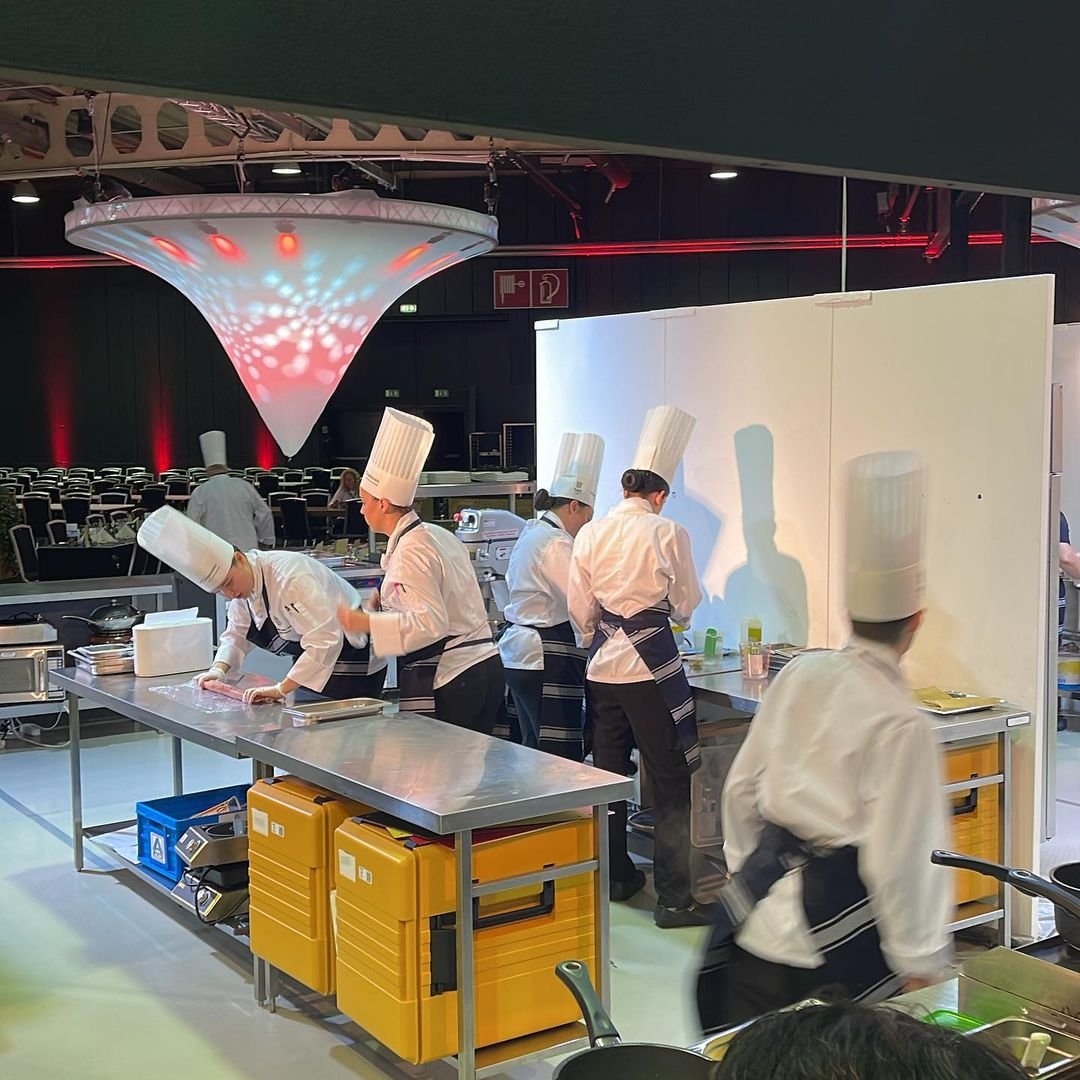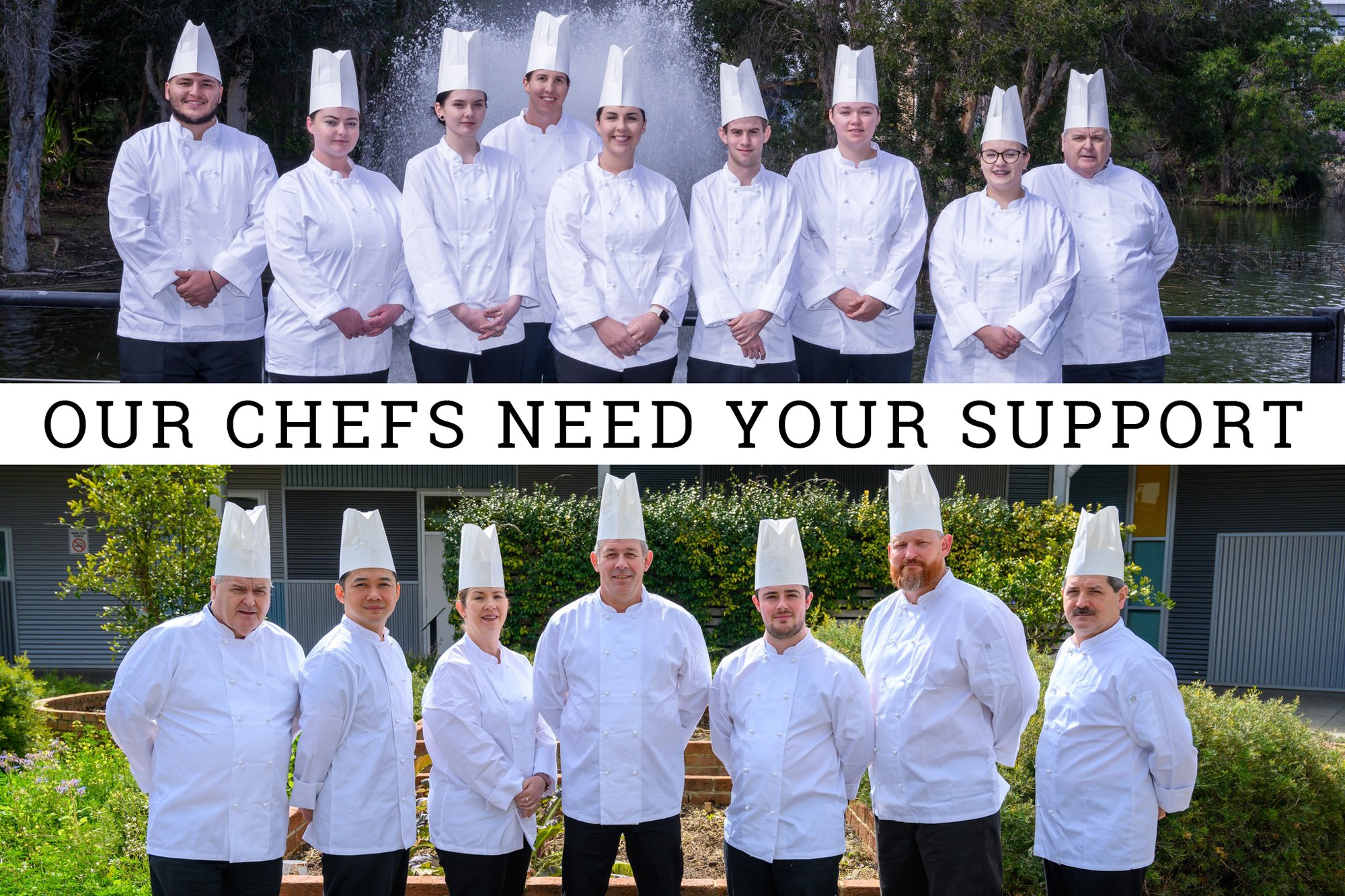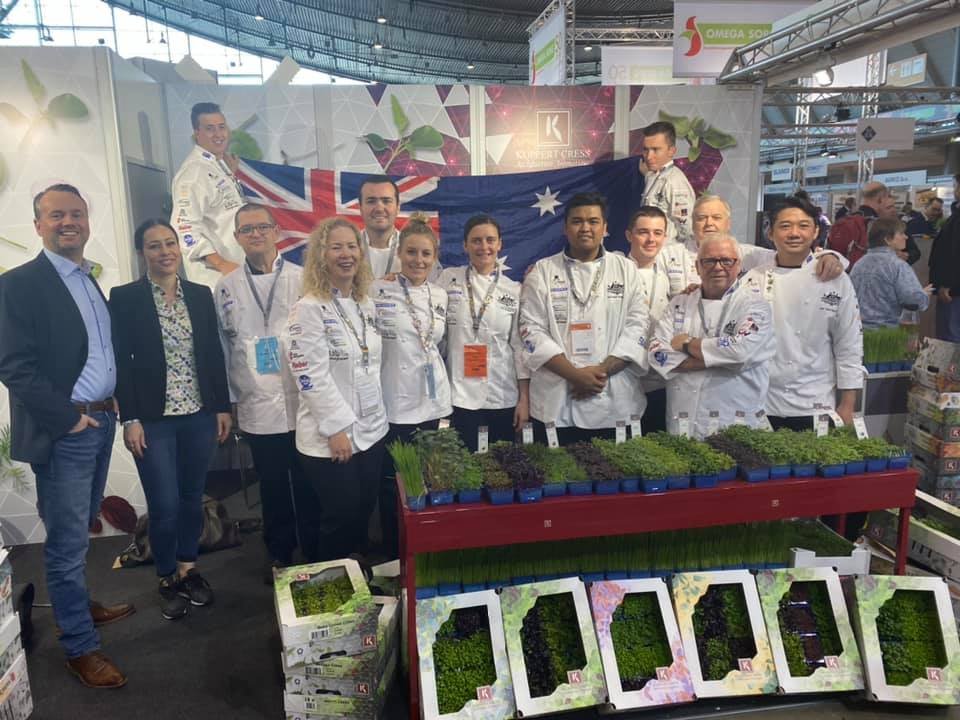Australia’s Culinary Olympics teams: taking on the world
Every four years, tying in with the Olympic Games, the Culinary Olympics are held in Germany, with the next competition set for February 2024. Australia’s teams, comprising 18 chefs from a variety of backgrounds and ethnicities, have been chosen and have already started training for the big event. We spoke to Senior Squad Captain Andrew Ballard, Youth Squad Captain Amber Heaton and Team Manager Pat O'Brien for an insight into the challenges our competitors are set to face.
LISTEN NOW: Aussie Chefs Going for Gold
The more you compete, the better you get
ANDREW BALLARD
Senior Squad Captain
Senior Squad Captain Andrew Ballard is no stranger to the competitive arena, having twice represented his native New Zealand in the Bocuse D’Or, as well as participating in many other events. In 2022 he won Professional Chef of the Year at Foodservice Australia.
“The more you compete, the better you get at it, hopefully,” Andrew says. “It’s a great way to refine your skillset. You can always tell when a chef has competition experience by the way they tackle their work – their mise en place is always on point, so is their time planning – those skills are enhanced when you compete on a regular basis, they become standard practice.”
Andrew adds competing also gives chefs the chance to expand their horizons. “In any given kitchen there’s very few people who get the chance to be creative - usually it’s one person, the head chef, who designs the menus and everyone else has to execute them. So for young chefs and those not running kitchens, competing is a chance to develop ideas and put them out in front of people for everyone to criticise.
“The Culinary Olympics, Bocuse D’or, Culinary World Cup are to avant garde food what the catwalk is to fashion”
“What you want from people is critical analysis of your dishes so you can continue to make those better, and this is especially the case in the Culinary Olympics where we’re trying to develop as close to a perfect set of meals as we can. We're always asking for genuine feedback. I still use ideas on my plate now that I got in that very first competition I did. You take these ideas and develop them, and you get the opportunity in the leadup to the competition to develop them to be as perfect as you possibly can, then you end up with these dishes which are very personal to you.
“In high level competition you’re actually developing concepts: the Olympics, Bocuse D'or, Culinary World Cup are to avant garde food what the catwalk is to fashion – a lot of people look to them for what the new trends will be. I see a lot of the ideas that come through these competitions filtering down into high level restaurants around the world.”
Australia’s Culinary Olympic Senior Squad comprises a team of six (three chefs and three assistants) cooking in the kitchen plus a reserve, with another two outside the kitchen – one acting as maître d and one understudy. The team has already competed last November at the Culinary World Cup, and will be engaging in other events pre-Olympics including one in Shanghai this November.
“They’re kind of qualifiers if you will - you've got 2 years of solid training leading into the actual Olympics, and for each of those years you're training almost on a daily basis. On an average week I would probably spend about 20 to 30 hours on the dish trials and background paperwork, workflow plans, refining the recipes, all the bureaucratic stuff that sits behind the job. We don’t get paid for any of that, it’s all on our own time, so it’s an expensive practice for someone to take part in.
“It’s extremely involved, the idea is to try to get as close to perfection as a country as you can. You're trying to think of how to tie in your country’s identity into some plates of food, that’s a tricky one as well. You have to go beyond using native ingredients to identify solidly with Australia. And it’s a very Eurocentric competition so the judges don’t necessarily understand what it means to be Australian.
“So a lot of planning goes into it, and that’s the case in the junior team as well. Luckily we have an amazing set of coaches and managers in Pat O'Brien, Peter Tischauser and Matt McBain. We’re very heavily dependent on them, they’ve achieved high levels of success in the Olympics already so their advice is invaluable.”
Heading a hyped-up team
AMBER HEATON
YOUTH SQUAD CAPTAIN
Youth Squad Captain Amber Heaton leads a hyped-up team: “This is the first time going to the culinary Olympics for all of us - you have to be under 25 to be on the youth squad, and most of us are already older than 20, so with the Culinary Olympics running only every four years you tend to have only one shot at it.”
As a seasoned competitor, Amber’s anticipating a high pressure environment: “Something always goes wrong in competition and it's the way you adapt - we’re all chefs so we need to think on our feet and adjust. Last year at the Culinary World Cup in Luxembourg our croquets hadn’t set hard enough so we had to improvise at the last moment. Right now we're all trying to do as many competitions and as much training as we can – if something’s going to go wrong, it’s best that it goes wrong during training because then you learn how to fix it.”
“Everyone has a lot of respect for each other, we’ve all got each other’s backs and we all want to walk away with a gold medal”
She describes the youth squad as “a good balance of personalities and we all get along. We’ve got the dynamic pretty right: everyone has a lot of respect for each other, we've all got each other’s backs and we all want to walk away with a gold medal and to achieve that we try to be there for each other and make sure no one falls behind.
“It’s a big thing going to compete in another country - some on the team have never travelled overseas before, and I don’t think any of us had competed internationally apart from myself before we went to the Culinary World Cup in Luxembourg last year. It’s only when you get there that you realise how high the standard is. So as we get closer to the event we try to train together once a month – unlike some of the European countries, where the team members all live close to each other, we’re spread right across Australia so it can take up to six hours for some of us to get to Perth for training.”
Fundraising a major concern
Patrick O’Brien
TEAM MANAGER
As Team Manager, or “the gaffer” as he describes it, Pat O’Brien has participated in all five Culinary Olympics over the past 21 years. His job includes making sure the team’s food reflects the high international standards within today’s foodservice industry. “We do that by keeping an eye on what competitions are happening around the world, looking at the dishes, photos and descriptions and seeing what’s out there,” Pat explains.
The teams train predominantly in Perth – “we’re lucky in that we have access to the North Metro TAFE facilities which are state of the art, so a lot of the training sessions are done there for both the fact we have the facilities and also it’s more financially viable. They’re usually done on weekends: people will fly in on the Saturday morning, get ready on Saturday, train on Sunday and Monday, and usually finish with a function on the Monday night to raise funds to pay for the training.”
“Raising the cash is the hardest part of the operation because we have to pay for accommodation, transport, food and airfares”
Fundraising is a major concern for the team – as Andrew Farrell points out, “If you look at some of the other competitors, such as the Scandinavian teams, they are government funded because it’s seen as a tourism draw, so they they turn up to the competitions in customised buses with built-in prep kitchens whereas we turn up with a hire car with our equipment in the back. Australians are famous for being able to jury-rig stuff up, that’s part of our national identity, but we still need to fly 21 people to Stuttgart, ship equipment to them and get them around. It’s an expensive undertaking - we're not trying to raise money to buy a personalised bus, but to get the bare minimum needed to excel over there.”
Pat O’Brien confirms “Raising the cash is the hardest part of the operation because we have to pay for accommodation, transport, food and airfares. Having said that, the sponsors we do have are so much appreciated, and a lot of them have been very loyal – they’ve been with us for the past 21 years and they continue to sponsor, plus we’re seeking new sponsors all the time.
“I think what people need to understand is that these young chefs literally give up their holidays, all their time off for nearly three years before this competition. It’s quite a big sacrifice they’re making, considering they're still working in the industry, and we all know how hard that is, but they’re quite dedicated young people and they need the industry's support without a shadow of a doubt.”
Support the Aussie Culinary team
Every donation no matter what size is greatly appreciated
The ACF have set up a GoFundMe page which at time of writing has raised $4070 of their $150,000 goal for the team. As Pat says, “Even $5 goes a long way.”
Amber adds, “I think sometimes people don’t want to donate because they think they can’t afford much, but if everyone just gave that little bit it could help us so much. I’m very grateful for the sponsors we do have and everyone who’s donated. Without their help we wouldn’t be able to do what we do.”
“If we can bring home a podium placement in the Olympics it will bring in tourism and hospitality dollars and be something we can be proud of”
And Andrew emphasises, “There’s all sorts of initiatives we're trying to tap into to raise funds but it is a difficult prospect. We did a dinner in Perth recently and gave up a week of our working life - the sponsors gave us a lot of product and that’s invaluable because it means all the money we raise goes into the effort to increase our chances of success.
“We want to be concentrating on the task at hand, to represent Australia’s culinary skills as best we can. And I’ve no doubt if we can bring home a podium placement in the Olympics it will bring in tourism and hospitality dollars and be something we can be proud of as a country - it will enhance our reputation and image. Then of course it makes it easier for the next team to get funding down the track.”
















